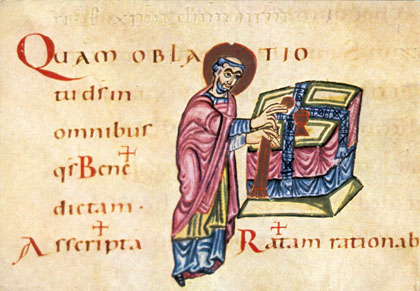Ipse est sacerdos, ipse est Deus

The lessons at Vigils this morning were extraordinarily compelling in the context of this Year of the Priest. (I use the Latin-French Lectionnaire monastique in six volumes edited by the Abbey of Solesmes. Would anyone know if a Latin-English version of the same lectionary is in preparation anywhere in the monastic world?)
First Lesson, Hosea 4:6-10
When Priests Lack Knowedge
My people are destroyed for lack of knowledge; because you have rejected knowledge, I reject you from being a priest to me. And since you have forgotten the law of your God, I also will forget your children. The more they increased, the more they sinned against me; I will change their glory into shame. They feed on the sin of my people; they are greedy for their iniquity. And it shall be like people, like priest; I will punish them for their ways, and requite them for their deeds. They shall eat, but not be satisfied; they shall play the harlot, but not multiply; because they have forsaken the LORD to cherish harlotry.
Here is my translation of the Second Lesson:
Fulgentius Ferrandus was a sixth century deacon of Carthage renowned for his defense of the orthodox faith against the Arians.
From the Dogmatic Letter of the Deacon Ferrandus, Against the Arians
The Action of the Priest
The action of the priest is twofold: first, he intercedes in order to be heard,
and then, once heard, he gives thanks.
In his intercession he offers the sacrifice of supplication,
in his thanksgiving he offers the sacrifice of praise.
In his intercession he presents the needs of sinners,
in his thanksgiving he recounts the benefits granted with mercy to those who make reparation.
In his intercession he implores pardon for the guilty,
in his thanksgiving he desires to rejoice with those who are absolved.
And so it is with Christ:
possessing an eternal priesthood uninterrupted by death as it is among other priests,
He interceded for us in offering the sacrifice of His own body upon the cross,
and He intercedes even now for us all,
desiring that we also should become a pure sacrifice unto God.
But when Divine Mercy will have become perfected in us,
when death will have been swallowed up in victory,
once all our sorrows will have disappeared,
when, filled with all good things,
we will sin no more,
no more will we lament,
no more will we have to suffer the enemy, the devil,
but we will reign in supreme peace and felicity.
Then, it is true, Christ will no longer intercede for us,
for we will have no need to ask for anything.
Never, however, will He cease giving thanks for us,
just as, in this present day, it is by the mediation of our High Priest
that we will offer the sacrifice of praise.
Always then will Christ be the High Priest
by whose mediation we can offer the sacrifice of praise.
Always, He is lower because He is the priest.
This notwithstanding, because Christ is forever one,
He Himself is the High Priest,
and He Himself is God who with the Father and the Holy Spirit
is adored, blessed, and glorified by the faithful.
He Himself intercedes,
He Himself gives thanks,
and He Himself bestows grace.

Dom Kirby, if you find said lectionary in any way, shape or form in English, please let me know as well!